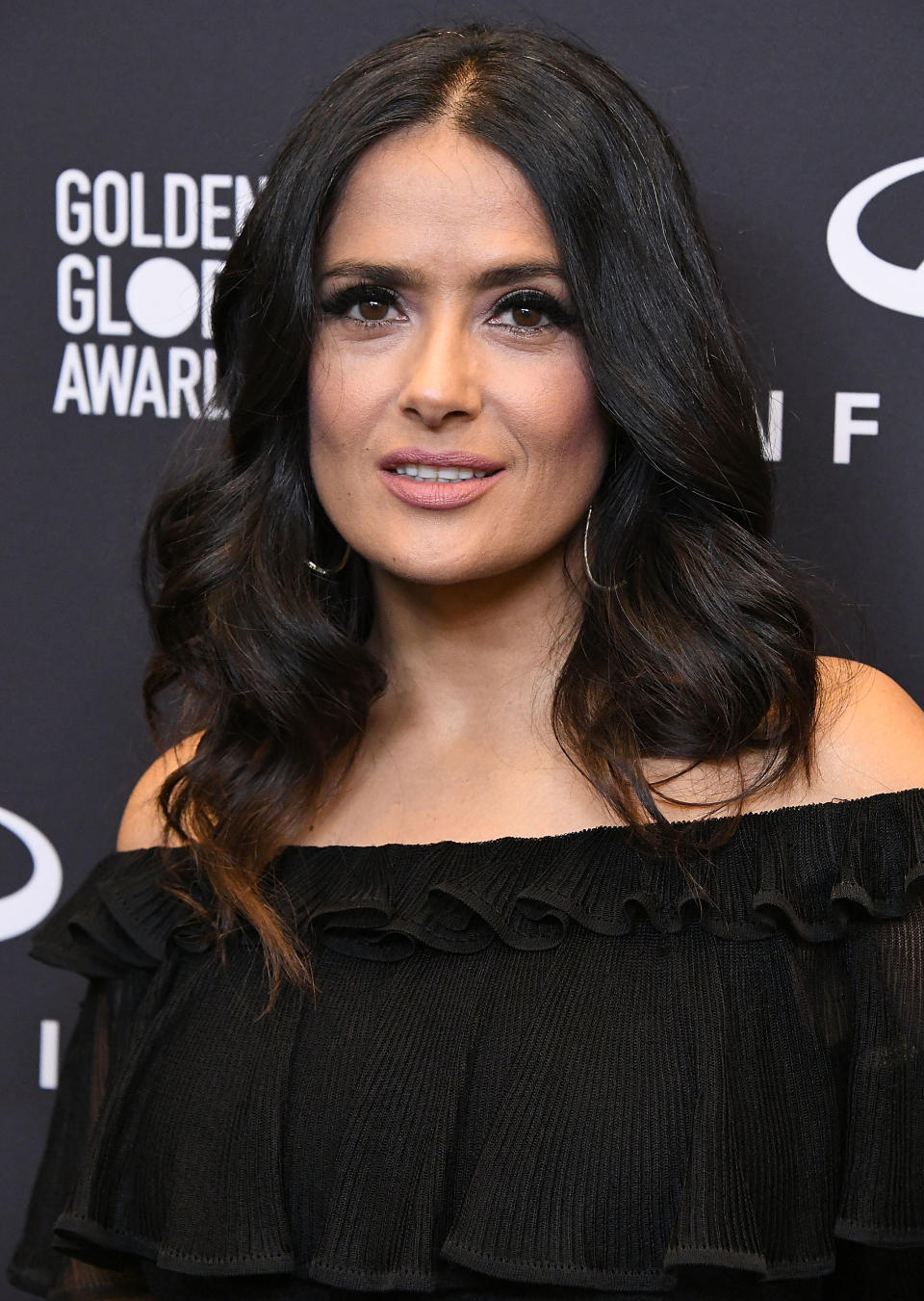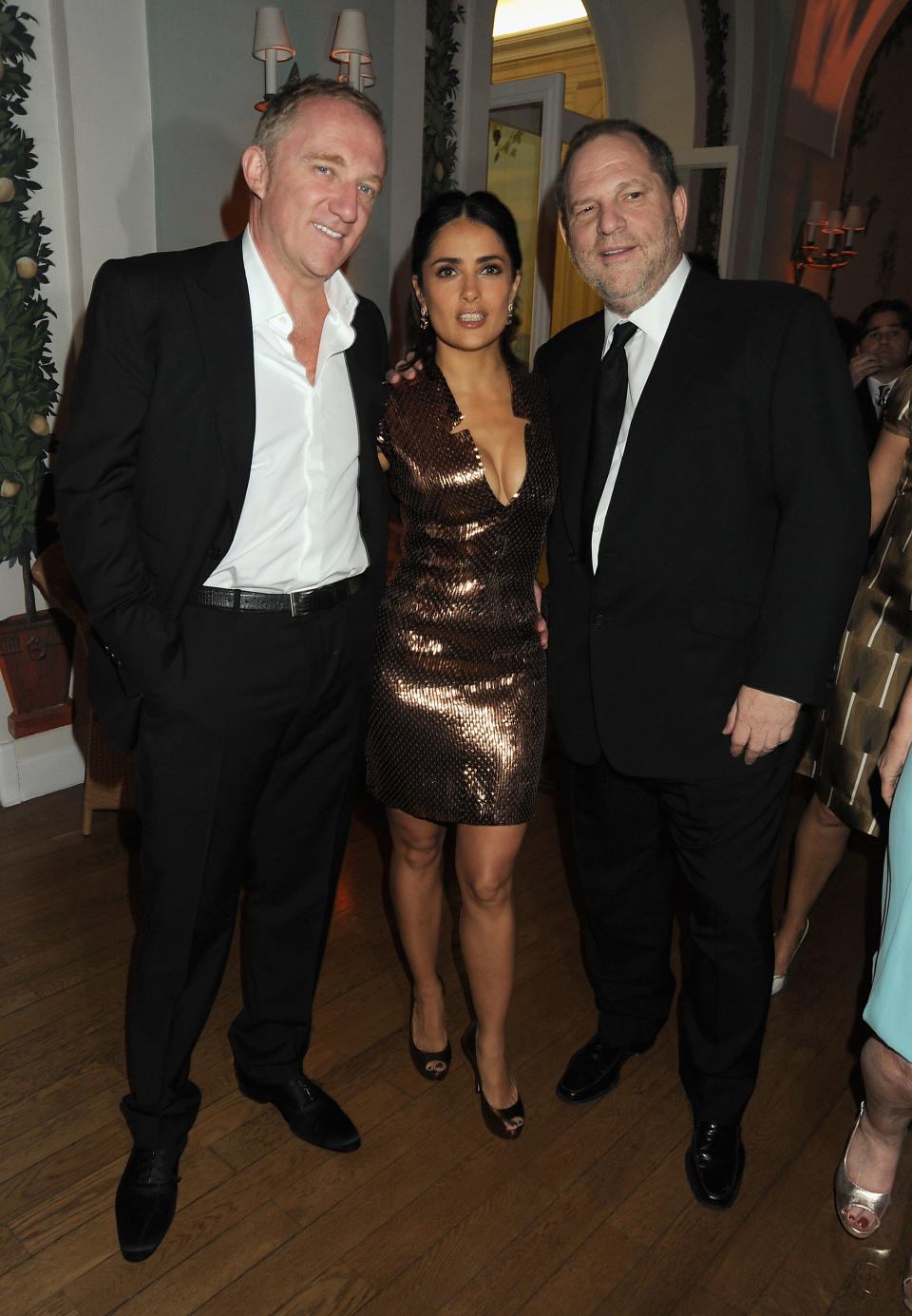Salma Hayek accuses Harvey Weinstein of sexual harassment: He's 'my monster too'
Salma Hayek has come forward to accuse Harvey Weinstein of sexual harassment.
The Oscar-nominated Mexican actress, whose films include Frida and Traffic, went public with her allegations on Wednesday, over two months after the movie honcho was first publicly accused of sexual misconduct in a New York Times piece. She shared her first-person story with the same publication in an op-ed titled “Harvey Weinstein Is My Monster Too.”
Hayek, who has been married to billionaire François-Henri Pinault since 2009, says she didn’t come forward initially because she had made “peace” with what happened to her. “I didn’t consider my voice important, nor did I think it would make a difference.” However, she came to realize that while she had confided to loved ones about being “bullied” by the disgraced movie mogul, she had “excluded a couple of details.”
Now 51, Hayek says that when she was victimized — after Weinstein agreed to produce 2002’s Frida via his company Miramax — it was a time when “it was unimaginable for a Mexican actress to aspire to a place in Hollywood. And even though I had proven them wrong, I was still a nobody.”

She was proud of convincing Weinstein to produce her passion project: “All I knew of Harvey at the time was that he had a remarkable intellect, he was a loyal friend, and a family man.” And he made a deal with her to make more movies with Miramax. However, she soon found herself having to repeatedly say “no” to him.
“No to me taking a shower with him,” she wrote. “No to letting him watch me take a shower. No to letting him give me a massage. No to letting a naked friend of his give me a massage. No to letting him give me oral sex. No to my getting naked with another woman. No, no, no, no, no.”
And with every “no” came “Harvey’s Machiavellian rage.” She wrote that “the absurdity of his demands went from getting a furious call in the middle of the night asking me to fire my agent for a fight he was having with him about a different movie” to “physically dragging me out of the opening gala of the Venice Film Festival, which was in honor of Frida, so I could hang out at his private party with him and some women I thought were models but I was told later were high-priced prostitutes.”
Once, “in an act of fury,” she says Weinstein threatened, “I will kill you, don’t think I can’t.”
After she rebuffed him, Hayek wrote, Weinstein tried to squeeze her out of Frida. After he made a list of “impossible tasks with a tight deadline,” she amazed even herself by completing them. However, she continued, “once we started filming, the sexual harassment stopped but the rage escalated.” When Weinstein visited the set, she said he criticized her performance of the famed artist. “He asked everyone in the room to step out except for me. He told me that the only thing I had going for me was my sex appeal and that there was none of that in this movie. So he told me he was going to shut down the film because no one would want to see me in that role.”
The only way he’d let her continue the film, Hayek said, was “if agreed to do a sex scene with another woman. And he demanded full-frontal nudity… It was clear to me he would never let me finish this movie without him having his fantasy one way or another. I had to say yes. By now so many years of my life had gone into this film.”
The day she shot the scene that she said she “believed would save the movie,” she says she “had a nervous breakdown: My body began to shake uncontrollably, my breath was short and I began to cry and cry, unable to stop, as if I were throwing up tears. Since those around me had no knowledge of my history of Harvey, they were very surprised by my struggle that morning. It was not because I would be naked with another woman. It was because I would be naked with her for Harvey Weinstein. But I could not tell them then.”
Hayek says Weinstein continued to give her trouble during postproduction, threatening to send the movie “straight to video” because “it was not good enough for a theatrical release.” Ultimately it was released and “this film that Harvey never wanted to do gave him a box-office success that no one could have predicted, and despite his lack of support, added six Academy Award nominations to his collection, including Best Actress.”
While Weinstein never offered her a starring role again, “Years later, when I ran into him at an event, he pulled me aside and told me he had stopped smoking and he had had a heart attack,” Hayek wrote. “He said he’d fallen in love and married Georgina Chapman, and that he was a changed man. Finally, he said to me: ‘You did well with Frida; we did a beautiful movie.’ … Harvey would never know how much those words meant to me.”

Hayek concluded her op-ed by thanking people for “listening to our experiences.” She said, “I hope that adding my voice to the chorus of those who are finally speaking out will shed light on why it is so difficult, and why so many of us have waited so long. Men sexually harassed because they could. Women are talking today because, in this new era, we finally can.”
Hayek is one of 90-some women — including fellow actresses Rose McGowan, Gwyneth Paltrow, Asia Argento, and Ashley Judd — who have accused Weinstein of sexual misconduct. Through his spokesperson, Weinstein has said, “Any allegations of nonconsensual sex are unequivocally denied by Mr. Weinstein. Mr. Weinstein has further confirmed that there were never any acts of retaliation against any women for refusing his advances.”
Read more from Yahoo Entertainment:


